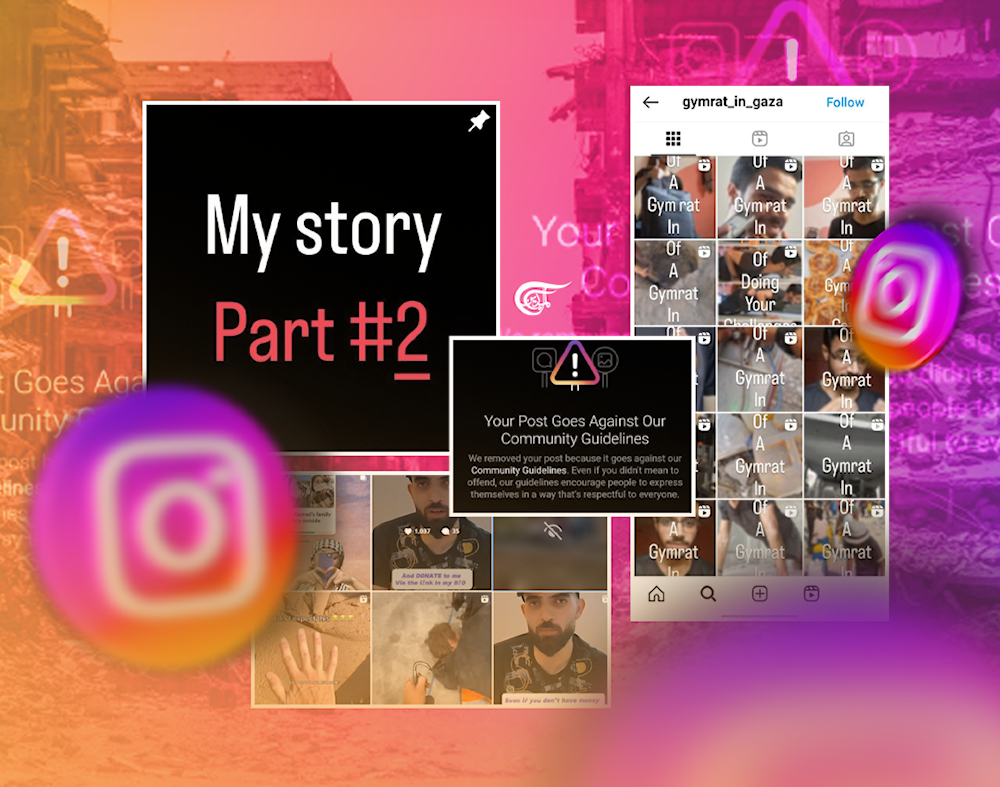Palestinians in Gaza are taking to Instagram to show their plight to the world
Firsthand accounts from Palestinians are among the most reliable sources for understanding the genocide in Gaza, drawing significant engagement and inspiring acts of solidarity and support from around the world.
-

Palestinians in Gaza rely on social media to tell stories not just of survival but of unyielding resilience and determination (Illustrated by Zeinab al-Hajj; Al Mayadeen English)
Aya Danielle, a Palestinian woman from the besieged Gaza Strip, stands in her small kitchen, surrounded by the rubble of what used to be her home. The shattered window offers a stark view of the destruction outside. "This is where we live now," she says, her voice steady but her eyes filled with deep sadness.
Just a few months ago, Aya’s life was filled with dreams. On March 3, 2023, she got engaged, a bright spot in the grim reality of Gaza. For eight months, she and her fiancé, Mohammed Alshayyah, meticulously planned their wedding set for November 2023. Aya envisioned a celebration filled with love and hope for a better future. However, "Israel’s" ongoing genocide in Gaza shattered those dreams, leaving their wedding plans in ruins.
Now, instead of planning her future, Aya spends her days documenting life under relentless bombings. She and Mohammed share videos on Instagram, capturing the daily struggles of their community. These videos show what daily life in Gaza looks like: cooking traditional Palestinian dishes with limited ingredients and aid materials, and queuing for water and other essential supplies.
"My heart breaks whenever I remember what could have been, I wanted a beautiful life with my husband, but Israel destroyed all my dreams", Aya told Al Mayadeen.
"Israel’s" ongoing genocide in Gaza has now entered its tenth month, with the death toll exceeding 40,000 people, according to official reports. However, a new estimate published in The Lancet suggests the actual number could be as high as 186,000, accounting for indirect deaths caused by shortages of medical care, food, shelter, and water. The genocide has displaced around 1.7 million people multiple times, representing around 77% of Gaza's total population of 2.2 million, leading to a severe humanitarian crisis.
Displaced Palestinians like Aya have turned to Instagram to share their stories with the world. These firsthand accounts provide a unique perspective on life under genocide. While some posts capture moments of daily life, others depict the harrowing realities, rescue efforts from the rubble, children mourning their parents, and direct reports of the devastation.
One such voice is Mohamed Hatem, known to his followers as "GymRat in Gaza." Based in Khan Younis, Hatem shares fitness vlogs and daily activities on Instagram.
In one of his striking posts, he lifts weights next to the remains of a bombed-out building. "Fitness helps me cope with stress", Hatem told Al Mayadeen. "Even in the toughest circumstances, we must find strength and perseverance". Despite the dire situation, he remains determined to stay resilient and inspire others to do the same. "Every day is a struggle," he wrote in one of his captions. "But we can’t give up. We must keep moving, for our families and our future."
Firsthand accounts from Palestinians are among the most reliable sources for understanding the genocide in Gaza. The content posted by Palestinians like Mohamed Hatem, Aya, and others has drawn significant engagement and inspired acts of solidarity and support from around the world.
Mohamed Hatem says he faces numerous obstacles in uploading his daily fitness vlogs.
"We have internet spots, where we pay $0.5 to $1 for 12 hours of internet. It’s not great, and I often wait 2-3 hours to upload a video or share an update," he stressed.
Staying connected with the outside world has always been difficult for Palestinians due to the occupation. Even before the current genocide, Gaza was limited to 2G cellular networks. However, since October 7, "Israel" has completely cut off electricity and internet access in the region.
One of the provisions of the Oslo Accords, signed by "Israel" and the Palestine Liberation Organization in 1993 and 1995, stipulated that "Israel" would oversee all cellular communications and technology developed by Palestinians.
This control has further complicated communication for people in Gaza, especially during the ongoing genocide. Frequent blackouts, severe damage to telecommunications infrastructure, and reported cyberattacks have made it nearly impossible for Palestinians to contact emergency services, update loved ones, or allow aid organizations to provide crucial services.
The IOF have obliterated what little cellular infrastructure Gaza had left. Of the 500 cell towers that existed before the war, 80% have now been destroyed. NetBlocks, an organization that monitors internet disruptions in conflict zones, reports that Gaza has experienced around 10 telecom blackouts since the war began.
Despite these obstacles, Palestinians are finding innovative ways to stay online. Many rely on eSIMs, generators, batteries, and solar panels to keep their devices charged. Organizations like Connecting Humanity provide internet access by donating eSIMs, enabling people in Gaza to connect to networks beyond the region. By December 2023, approximately 200,000 people had gained internet access through these means.
If difficulties with the internet and electricity weren't enough, Meta has been censoring Palestinian content on platforms like Instagram and Facebook. This includes removing posts, photos, and videos that show or discuss the Palestinian situation, often without clear reasons.
Users have also reported that their posts become less visible or are shadowbanned. Prominent accounts have faced suspensions, and Meta has also been criticized for applying its rules inconsistently, often affecting Palestinian content more than others. Despite claiming technical issues, many believe these actions are biased and call for more transparency from Meta.
Hatem says his Instagram engagement has been heavily reduced over the past few days.
"At first, my posts were getting a lot of attention, but then, seemingly out of nowhere, the reach just vanished. It affects how many people I'm able to reach out to for help and donations," he said.
Jalal Abukhater, an advocacy manager at The Arab Center for the Advancement of Social Media, has been at the forefront of efforts to combat this, "Meta systematically restricts Palestinian content, particularly that related to Gaza".
"This includes reducing the visibility of posts or preventing them from appearing in search results and hashtags. The company needs to be more transparent about its policies, especially regarding requests from Israeli government agencies to restrict content."
According to The Markup's investigation, Instagram appears to have restricted and shadowbanned posts supporting Palestine. "Posts using the hashtag #FreePalestine or containing pro-Palestine content were found to be less visible or not visible at all," the report states.
The investigation further revealed potential algorithmic bias, with metadata analysis showing that keywords and hashtags related to Palestine triggered suppression.
Meta has denied intentional censorship but acknowledged the possibility of inadvertent algorithmic impacts on certain content.
Sukanya, a media professional in India, has never been to Gaza. Still, like millions worldwide, she is experiencing the carnage in Gaza through the videos shared by Palestinians on social media.
"Watching the horrific videos from Gaza is a strange and unsettling experience. It makes me realize how easy it is for someone like me, living a privileged life, to remain oblivious to the immense suffering happening elsewhere," she told Al Mayadeen.
Sukanya has initiated a fundraising campaign to support displaced Palestinians by organizing a perfume-winning contest to raise funds. Her efforts have made a tangible difference, particularly for Mona Hussein Saqer, a displaced Palestinian with roots in Beit Hanoun, who now lives in the al-Nuseirat refugee camp.
Sukanya speaks with Mona regularly and writes poems to stay connected: "I make sure to talk to her about everyday things. I share my daily routine and ask her about her day. I keep our conversations focused on the usual because outside of them, she is living through a war."
Mona shares her daily routine through videos on Instagram, telling Al Mayadeen, "Through my posts, I aim to show the world that Gazans are human beings with dreams, aspirations, and a deep love for life. Whether it's a video of a birthday celebration, a trip to the local markets, or a simple walk, I want to highlight the normalcy and humanity that persist even in tough times."
As the world looks on, the voices from Gaza persist, cutting through the destruction to tell stories not just of survival but of unyielding resilience and determination.

 Mohammad Asif Khan
Mohammad Asif Khan
 8 Min Read
8 Min Read







